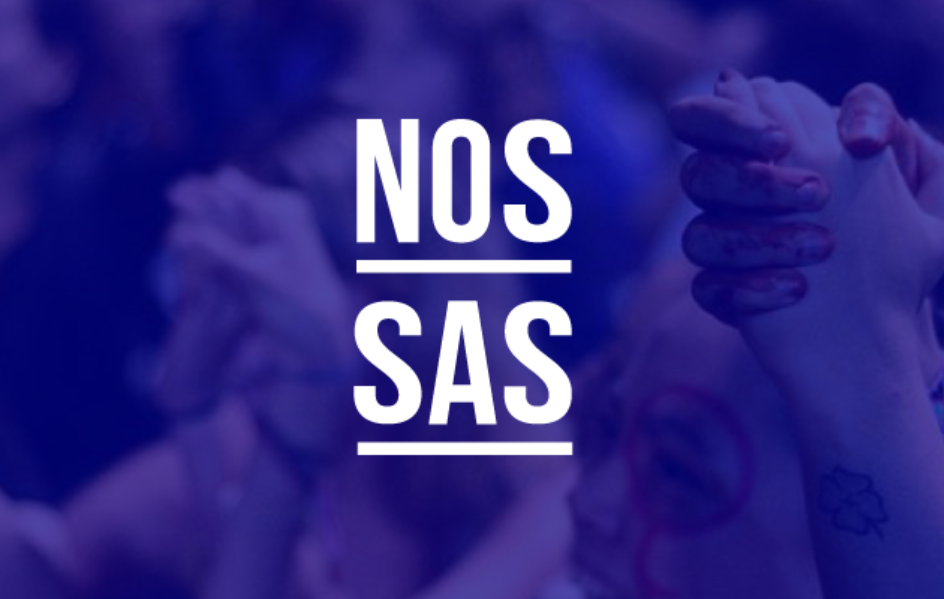
The other day, a friend of mine who was going to speak at a conference asked me for good cases of civic tech “that works”. I didn’t hesitate, and advised him to get in touch with the people at NOSSAS, a Brazilian organization that combines online and offline collective action to promote social change (full disclosure, I am a member of their board). Until now, however, it has been a challenge to convey to unfamiliar audiences what the organization does, and how. This is why I am particularly glad to see that they have produced a short documentary (16 mins) “NOSSAS: a Laboratory of Other Futures”, which provides a glimpse into the organisation’s thinking and work. So, adding to the video, here are some of the reasons why I think this is a great example of a civic tech organization:
- Blending online and offline: “oneline” activism

To my knowledge, no other organization combines online and offline action better than NOSSAS, with online mobilization often used as a gateway to more intensive (and offline) types of participation.

NOSSAS’ successful campaign in the State of Sao Paulo for the creation of the first Police Station dedicated to combating violence against women.
Along with their digital campaigns, they will often mobilize citizens to take offline action. This includes, for instance, attending legislative votes and exerting pressure on elected officials, or taking part in more performative interventions that draw attention from the mainstream media and the population as a whole.
- Beyond the obvious target
Understanding that policy change often requires more than a simple stroke of a pen, NOSSAS’ engagement with public officials goes beyond the decision-makers who are formally entitled to make the policy change (e.g. mayor, governor). Their initiatives consistently target the ensemble of actors (e.g. legislators, public prosecutors) who may have an influence over a policy decision or implementation (either directly or indirectly).
NOSSAS’ rich combination of online and offline tactics of popular mobilization, together with this well-calculated engagement of state actors, creates multiple pressure points for governments to respond.
- Civil Society as a Platform
A common denominator among the majority of traditional civil society organizations (CSOs) is the self-appointed representation of a specific constituency. In other words, these CSOs will often represent a fixed set of interests of a given constituency by which the CSOs have neither been elected nor authorized. However, one could argue that – for better or for worse – in a period in which citizens increasingly engage directly in political action through a variety of means, the importance of these traditional CSOs may be reduced at worse, and redefined at best.
In this respect, NOSSAS is a great example of emerging CSOs that are more adapted to their time. As such, these new CSOs do not claim to represent the interests of a certain constituency. Instead, they play the role of a platform that amplifies the voices of individuals, facilitating their engagement in collective (connective?) action on a multiplicity of issues they care about.
- Structured knowledge
NOSSAS does have great knowledge of two key ingredients for civic tech: 1) how to mobilize citizens, and 2) how to get governments to respond. But what I find particularly interesting is that they translated this knowledge into a structured methodology to provide online and offline support to users of NOSSAS’ platforms to further their causes.
Does it work? Some evidence suggests that it does. For instance, Pressure Pan is a platform that allows any citizen to initiate collective action to exert pressure on the government regarding a particular agenda (e.g. public safety, mobility rights). And as we documented in Civic Tech in the Global South, while not all of the hundreds of campaigns on Pressure Pan can benefit from specific support from NOSSAS, when they do they are three times more likely to succeed.
- A/B testing
A/B testing is similar to an online version of a randomized controlled trial. One of the main differences however is that A/B testing is low-cost, easily deployed (when you have the expertise), and real-time. Yet very few civic tech organizations take advantage of that opportunity. This not the case for NOSSAS: at any given point they are running a number of A/B tests, which help them to refine their mobilization tactics on an ongoing basis. If this sounds like a simple detail, it is not. Beyond generating precious knowledge for the organization’s core functions, the capacity to run A/B tests is often a good litmus test for whether organizations know how to leverage technology beyond the most obvious uses.
- Results
And finally, unlike many civic tech initiatives, NOSSAS does have a solid track record of results, a few of which are featured in the video, which you can watch below:
Before joining the board of Nossas, I was already a fan of the work they do: online, offline, and as a platform. I look forward to their work in 2018.
***
For more about Nossas, also read this excellent post by Felipe Estefan from the Omidyar Network.






